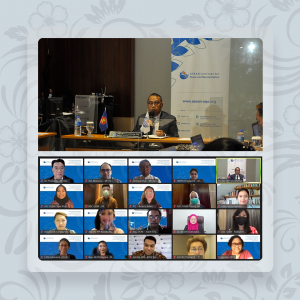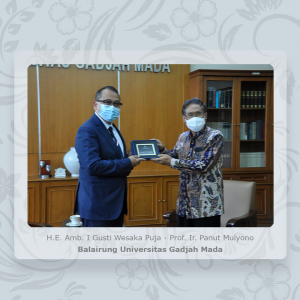Yogyakarta, 8 October 2020.
On Thursday, 8 October 2020, ASEAN Studies Center UGM held a webinar under the theme of Solidifying the Role of Think Tanks and CSOs in the Advocacy to Strengthen the ASEAN Commission of Women and Children (ACWC). The webinar, with the support of Embassy of the Kingdom of the Netherlands and FORUM-ASIA, was held online via YouTube at 9am. The webinar was held to launch the Report on the ASEAN Commission on the Promotion and Protection of the Rights of Women and Children (ACWC) +10 titled Assessing the Commission’s Impact on Protecting Women and Children’s Right in ASEAN, composed by FORUM-ASIA.
The webinar invited five keynote speakers, namely Rachel Arinii Judhistasari (FORUM-ASIA East Asia and ASEAN Advocacy Programme Manager), Sri Danti Anwar (Indonesia’s ACWC Representative for Women’s Right), Yuyum Fhahni Paryani (Indonesia’s ACWC Representative for Children’s Rights), Yuyun Wahyuningrum (Representative of Indonesia to the AICHR), and Agustina Kustulasari (Senior Fellow, ASEAN Studies Center, Universitas Gadjah Mada).
The webinar commenced with opening remarks by Dafri Agussalim as Executive Director of ASEAN Studies Center, Universitas Gadjah Mada, and Shamini Darshni Kaliemuthu, Executive Director of FORUM-ASIA. Dafri highlighted the importance of protection of women and children as they are also part of the community. Following these remarks, the Report on Assessing the Commission’s Impact on Protecting Women and Childrens Right in ASEAN was officially launched.
The webinar, question, and answer session was moderated by Rita Serena Kolibonso.
The first speaker, Rachel Arinii Judhistasari, explained the findings within the Report with a highlight on the need for a robust regional mechanism to address human rights violations and discrimination. Although the mandate of ACWC includes balancing rights and responsibility, a pretext of religion and socio-cultural norms which often detrimental to children and women’s rights, this has yet to take form. The Report also suggested the importance of solidifying the role of CSOs across the region to support the work of ACWC.
The second speaker representing ACWC (women), Sri Danti Anwar, stated that 15 programs focusing on gender mainstreaming and strengthening human protection had successfully been achieved. Still, further plans need to be carried out, including eliminating violence against women and drafting the standard and protocol guidelines for ACWC. However, these initiatives were not without challenges. There remains a looming gap between the socio-cultural, economic, and political-security communities that often work in silo.
Similar to the effort of the ACWC (women), as specified by Yuyum Fhahni Paryani representing ACWC (children), the implementation of the current ACWC Work Plan 2016-2020 is an effort to be in step with a contemporary trend in the region in these fast-changing times. The next work plan’s strategic initiative would explore a “life-cycle” approach to take a more in-depth look at the needs of women and children in particular. This approach would ensure that they are advocated for and will not be left behind.
Meanwhile, Yuyun Wahyuningrum highlighted synergy efforts between AICHR, ACWC, and CSOs to further the agenda of gender mainstreaming in ASEAN. The creation of regionalization allows us to organize cooperation talks about the rights of women and children. In terms of ASEAN, to develop the standard, states need a space and interconnection through intergovernmental models that centralize on states’ initiatives.
It is also essential to understand similar ratifications pertaining to the rights of women and children, such as Convention on the Elimination of all Forms of Discrimination Against Women (CEDAW) and the Convention on the Rights of the Child (CRC) as Agustina Kustulasari presented in her findings. However, ASEAN’s moves have been slow-paced, particularly in areas of policy-making and implementation. It is challenged mostly by the non-intervention principle and peer-pressure. To address this issue, she suggested the involvement of other strategic policy actors such as the media to play their vital role as a potent agent in shaping the language of gender and the role of academia to provide an academic approach in addressing the challenges of ACWC.
The following are key points summarized from the Question and Answer session, namely: CSOs and think-tanks have to work closer if more advocative policies are to be developed in the future, the importance of distinguishing particular groups to identify their specific needs in the society, such as domestic violence victims during the lockdown, inclusive education to respond to mixed migration, mitigate the impacts of COVID-19 to women and children, and to monitor ASEAN member states’ response to these issues and further develop policy framework through AICHR. These points will be taken into account when establishing the forthcoming working paper.




